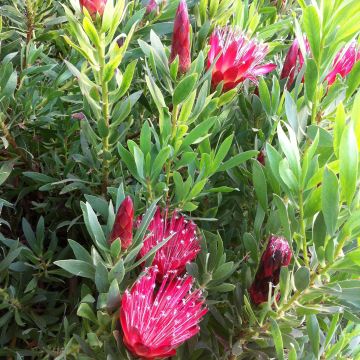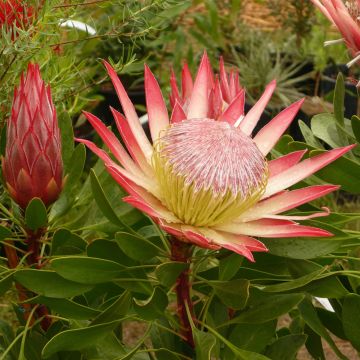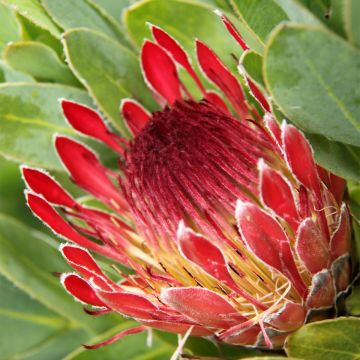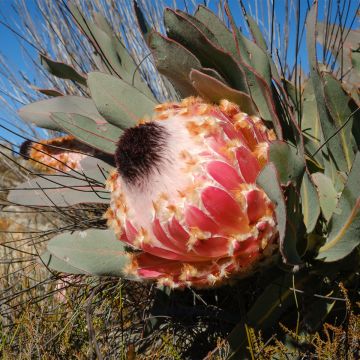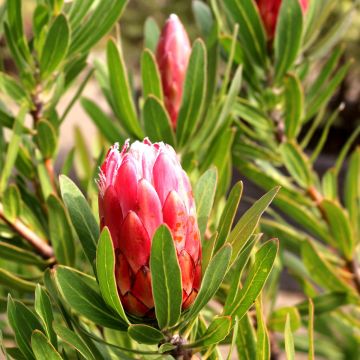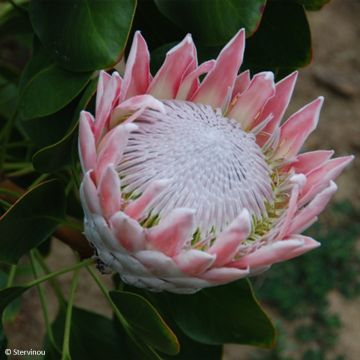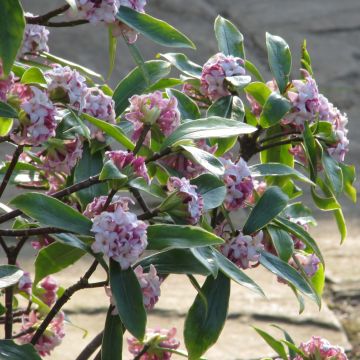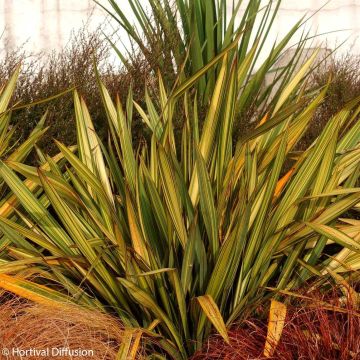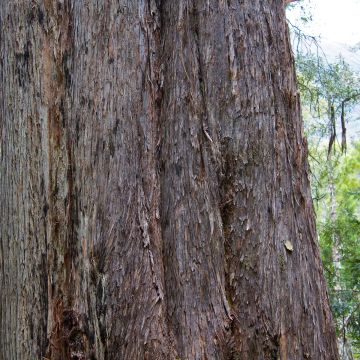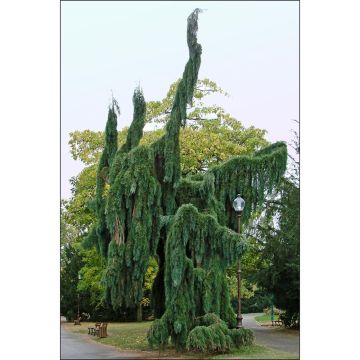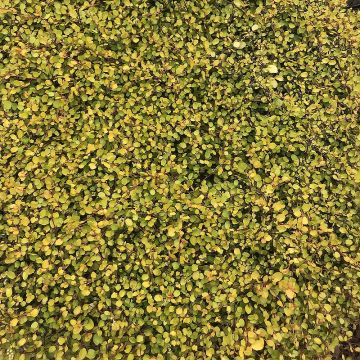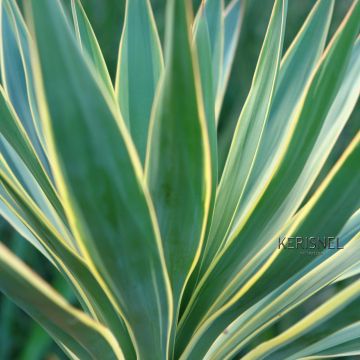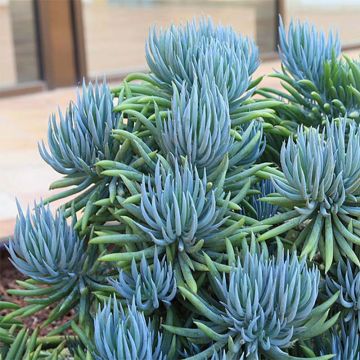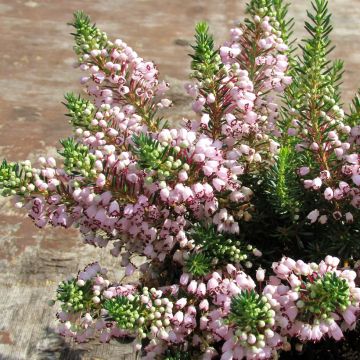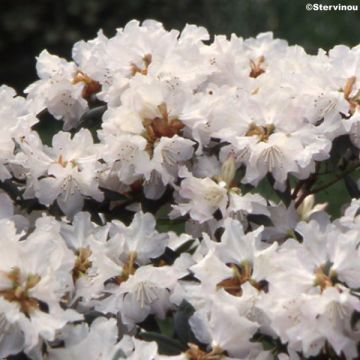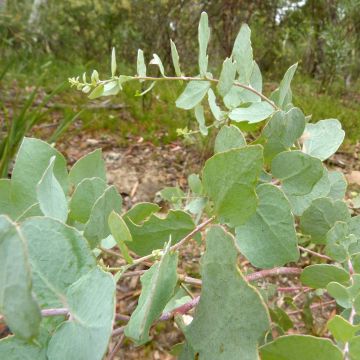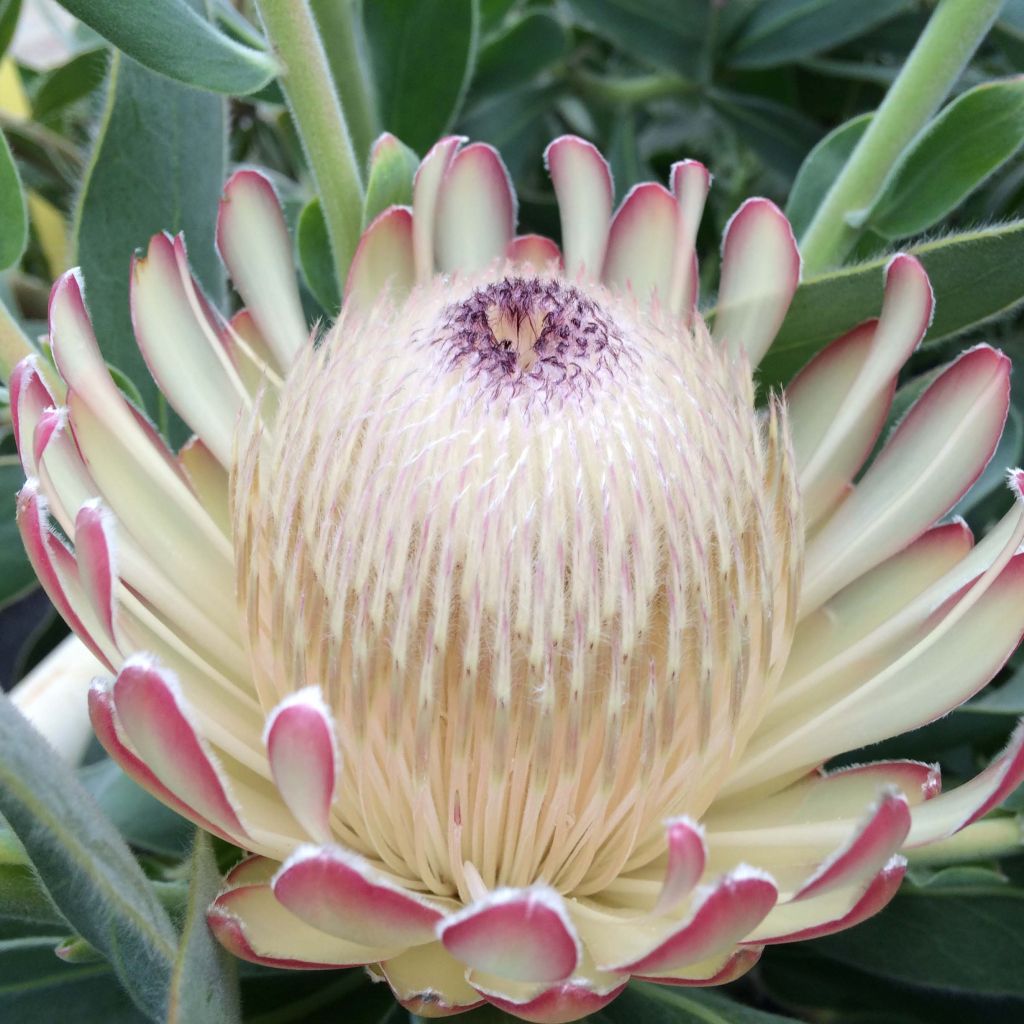

Protea Susara
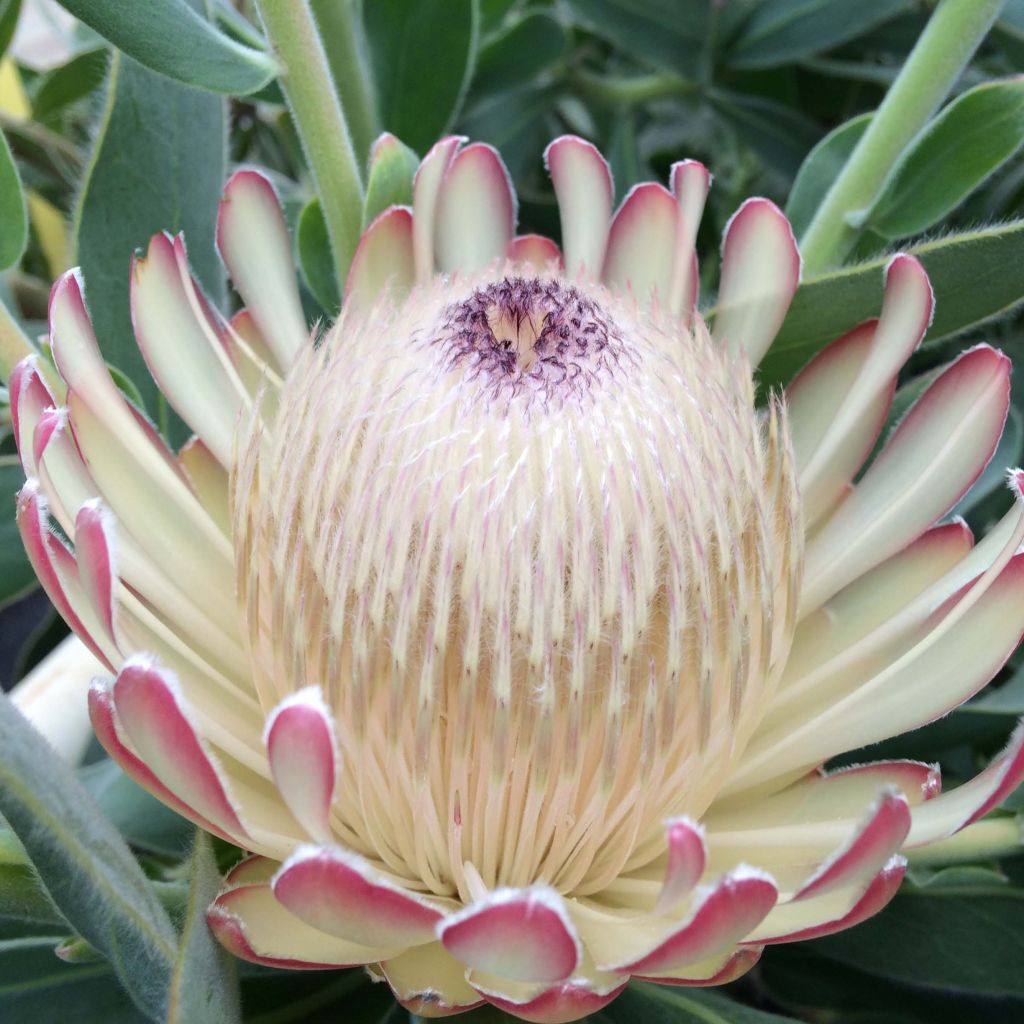

Protea Susara - Protée hybride
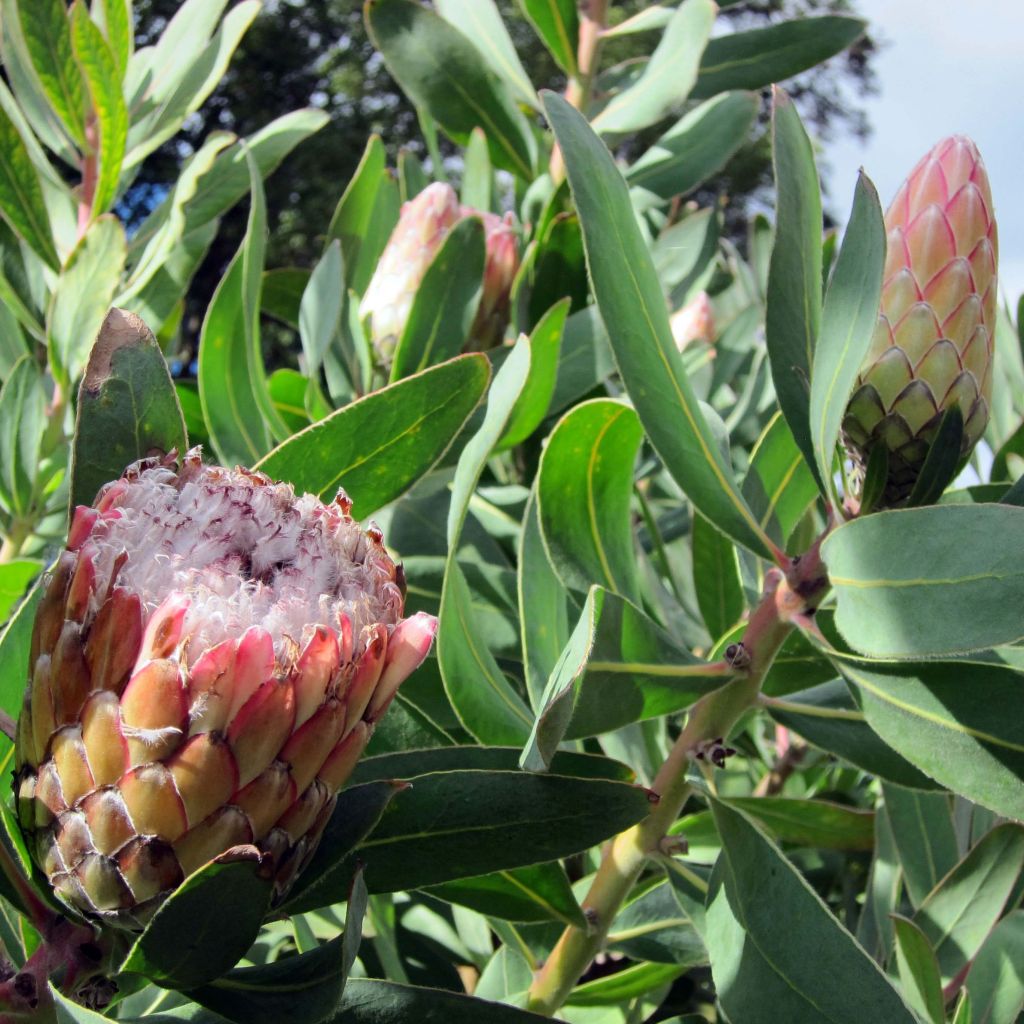

Protea Susara - Protée hybride
Protea Susara
Protea susannae x magnifica Susara
Protea, Hybrid Protea, Sugar Bush
Why not try an alternative variety in stock?
View all →This plant carries a 24 months recovery warranty
More information
We guarantee the quality of our plants for a full growing cycle, and will replace at our expense any plant that fails to recover under normal climatic and planting conditions.
From €5.90 for pickup delivery and €6.90 for home delivery
Express home delivery from €8.90.
Does this plant fit my garden?
Set up your Plantfit profile →
Description
Protea Susara is an absolutely charming hybrid protea, with a dense habit and an exquisitely refined flowering in pastel tones. It develops into a nicely rounded large shrub and bears wonderful, cup-shaped inflorescences in spring, composed of pearly white-pink bracts surrounding a large heart of white stamens, with a small black dot in the centre. Proteas are rather tender plants, strange and fascinating. According to enthusiasts of these sometimes capricious plants, this is one of the most robust varieties. Cultivating it in large pots is preferable, outside areas with mild winters, not only to control the composition of the growing substrate, but also because it is imperative to protect the plant from the first frosts.
The 'Susara' protea is a horticultural creation resulting from the cross-breeding of Protea susannae and P. magnifica, the queen protea. The first parent, which hybridises easily, has passed on its robustness, ease of cultivation, and tolerance towards a fairly wide range of soils, while the second parent has given the hybrid its large pastel-coloured flowers, bushy habit, and increased hardiness, down to -7 °C (19.4 °F). Both are shrubby perennial plants in the protea family, native to the Cape region in South Africa, in a Mediterranean-type climate. Unusual in every way, proteas have seeds that can only germinate after a fire.
'Susara' develops multiple thick stems, well branched from the base. It reaches an average size of 1.75m (6ft) in all directions. It bears long alternate leaves, elongated and pointed, leathery, with the ability to absorb atmospheric moisture. They are light green, finely edged with purple. Flowering takes place from March to May. The inflorescences are large heads, carried at the end of each branch, measuring 10 to 15 cm (4 to 6 in) in diameter. Mature and well-established plants can produce up to several dozen flower heads per season. The flower buds resemble magnificent thistles with pearly scales. The head opens after 1 month. The thin, creamy white-pink bracts, outlined by a fine deep pink edge, open to reveal a large, pale white to pale pink, silky and woolly heart, composed of true flowers. Each flowers bears a bunch of stamens and a filamentous pistil which, together, give the impression of silky fiber inside the inflorescence. The centre of the flower head bears a striking, black heart. The flowers attract many pollinating insects and give way to velvety seeds, almost as large as walnuts. The thick roots of this plant also serve as a storage organ. In case of fire, the protea is capable of regenerating from its roots, fertilised by its own ashes.
The 'Susara' protea is a sensational plant that does not leave anyone indifferent. Florists, as well as gardeners, appreciate the longevity of its often oversized flowers, adorned with refined colours. It prefers coastal gardens spared by severe frosts, with light, poor, and not too chalky soils. Well adapted to the Mediterranean climate, it tolerates poor to arid and inhospitable soils, and will look striking as a standalone plant, on vast slopes or as a backdrop to dry garden beds, as long as it is planted in a open position, in full sun. In the exotic garden, it can be associated with Tree Echium or Pride of Madeira, Puya, Euphorbia characias, Euphorbia mellifera, Giant Fennel, Leucadendron, Melianthus major, palm trees (Trachycarpus fortunei, Sabal minor), or even hybrid mulleins.
A unique root system, adapted to poor and dry soils:
Plants that grow in nutrient-poor soils often form a symbiosis with soil fungi that promote the absorption of water and nutrients. But Proteas have chosen a different strategy: they develop a large quantity of distinctive lateral roots along their main roots. These roots are called proteoids and are induced by rainfall, developing under the layer of dead leaves that covers the base of the plant. Rain promotes the decomposition of leaves, resulting in the release of nutrients. These ephemeral roots generally dry up at the end of the growth period. They have a water and nutrient absorption activity that is twice as high as "normal" roots.
Report an error about the product description
Protea Susara in pictures
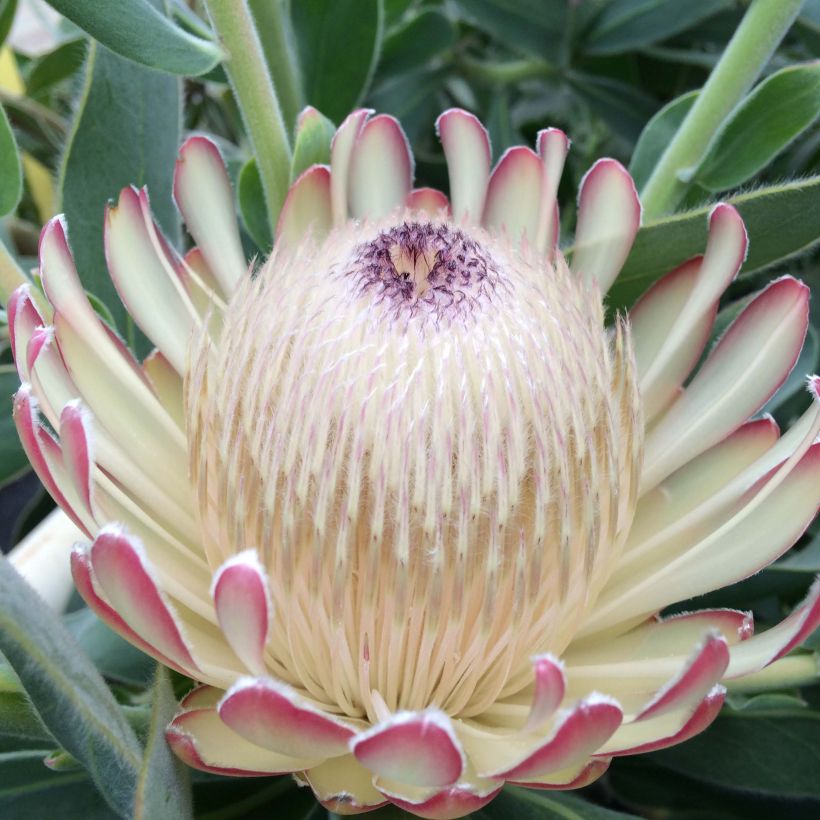

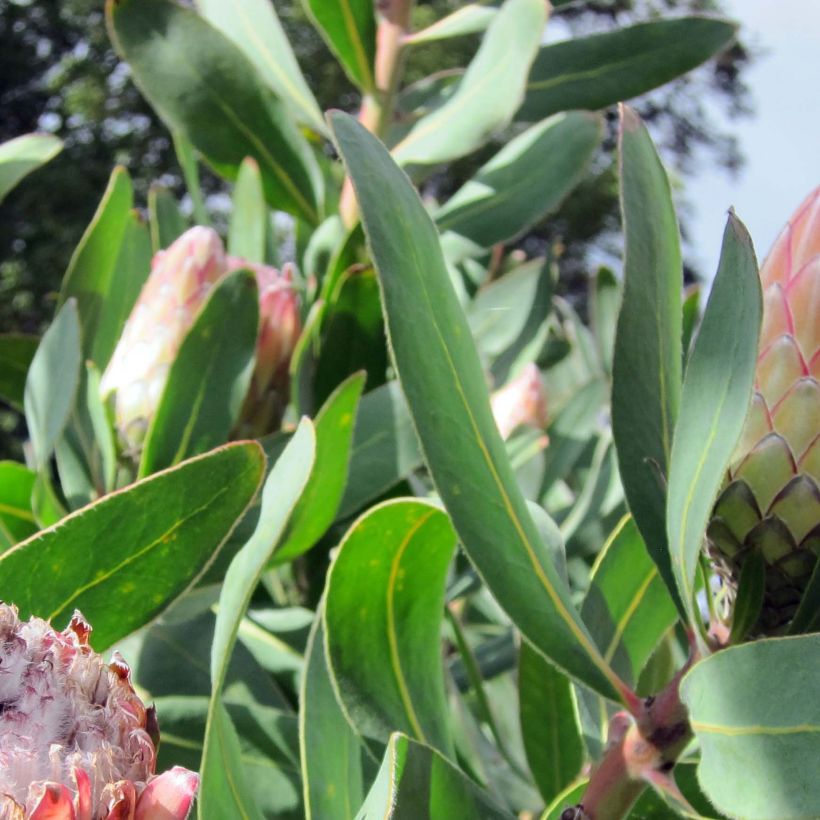

Plant habit
Flowering
Foliage
Botanical data
Protea
susannae x magnifica
Susara
Proteaceae
Protea, Hybrid Protea, Sugar Bush
Cultivar or hybrid
Other Protea
Planting and care
Plant the 'Susara' protea preferably in spring, or in autumn in mild climates, in a very sunny and sheltered position. This plant requires a light, well-drained, poor, mineral soil, with a tendency towards acidic or neutral pH (6.5<pH<7.5). A mixture including leaf compost, a little bit of ericaceous compost or crushed pine bark, and coarse river sand or perlite is usually appropriate. Proteas are sensitive to excess phosphates and nitrates, so avoid giving them too much fertiliser, or even fertilising them altogether. A small amount of dried blood at the base of the plant, in spring, is generally sufficient. While adult plants can tolerate occasional frosts of around -7 °C (19.4 °F) in dry soils, young proteas should be protected from frost during their first few years, in a frost-free area in cool climates or under a protective fleece in regions with mild winters. This plant flowers after approximately 4 to 5 years of cultivation from sowing. For indoor cultivation, it is important to ensure good ventilation and to avoid watering with water that is too hard (some mineral waters or low-calcium spring waters are particularly suitable, have a look at the labels).
Planting period
Intended location
Care
This item has not been reviewed yet - be the first to leave a review about it.
Evergreen shrubs
Haven't found what you were looking for?
Hardiness is the lowest winter temperature a plant can endure without suffering serious damage or even dying. However, hardiness is affected by location (a sheltered area, such as a patio), protection (winter cover) and soil type (hardiness is improved by well-drained soil).

Photo Sharing Terms & Conditions
In order to encourage gardeners to interact and share their experiences, Promesse de fleurs offers various media enabling content to be uploaded onto its Site - in particular via the ‘Photo sharing’ module.
The User agrees to refrain from:
- Posting any content that is illegal, prejudicial, insulting, racist, inciteful to hatred, revisionist, contrary to public decency, that infringes on privacy or on the privacy rights of third parties, in particular the publicity rights of persons and goods, intellectual property rights, or the right to privacy.
- Submitting content on behalf of a third party;
- Impersonate the identity of a third party and/or publish any personal information about a third party;
In general, the User undertakes to refrain from any unethical behaviour.
All Content (in particular text, comments, files, images, photos, videos, creative works, etc.), which may be subject to property or intellectual property rights, image or other private rights, shall remain the property of the User, subject to the limited rights granted by the terms of the licence granted by Promesse de fleurs as stated below. Users are at liberty to publish or not to publish such Content on the Site, notably via the ‘Photo Sharing’ facility, and accept that this Content shall be made public and freely accessible, notably on the Internet.
Users further acknowledge, undertake to have ,and guarantee that they hold all necessary rights and permissions to publish such material on the Site, in particular with regard to the legislation in force pertaining to any privacy, property, intellectual property, image, or contractual rights, or rights of any other nature. By publishing such Content on the Site, Users acknowledge accepting full liability as publishers of the Content within the meaning of the law, and grant Promesse de fleurs, free of charge, an inclusive, worldwide licence for the said Content for the entire duration of its publication, including all reproduction, representation, up/downloading, displaying, performing, transmission, and storage rights.
Users also grant permission for their name to be linked to the Content and accept that this link may not always be made available.
By engaging in posting material, Users consent to their Content becoming automatically accessible on the Internet, in particular on other sites and/or blogs and/or web pages of the Promesse de fleurs site, including in particular social pages and the Promesse de fleurs catalogue.
Users may secure the removal of entrusted content free of charge by issuing a simple request via our contact form.
The flowering period indicated on our website applies to countries and regions located in USDA zone 8 (France, the United Kingdom, Ireland, the Netherlands, etc.)
It will vary according to where you live:
- In zones 9 to 10 (Italy, Spain, Greece, etc.), flowering will occur about 2 to 4 weeks earlier.
- In zones 6 to 7 (Germany, Poland, Slovenia, and lower mountainous regions), flowering will be delayed by 2 to 3 weeks.
- In zone 5 (Central Europe, Scandinavia), blooming will be delayed by 3 to 5 weeks.
In temperate climates, pruning of spring-flowering shrubs (forsythia, spireas, etc.) should be done just after flowering.
Pruning of summer-flowering shrubs (Indian Lilac, Perovskia, etc.) can be done in winter or spring.
In cold regions as well as with frost-sensitive plants, avoid pruning too early when severe frosts may still occur.
The planting period indicated on our website applies to countries and regions located in USDA zone 8 (France, United Kingdom, Ireland, Netherlands).
It will vary according to where you live:
- In Mediterranean zones (Marseille, Madrid, Milan, etc.), autumn and winter are the best planting periods.
- In continental zones (Strasbourg, Munich, Vienna, etc.), delay planting by 2 to 3 weeks in spring and bring it forward by 2 to 4 weeks in autumn.
- In mountainous regions (the Alps, Pyrenees, Carpathians, etc.), it is best to plant in late spring (May-June) or late summer (August-September).
The harvesting period indicated on our website applies to countries and regions in USDA zone 8 (France, England, Ireland, the Netherlands).
In colder areas (Scandinavia, Poland, Austria...) fruit and vegetable harvests are likely to be delayed by 3-4 weeks.
In warmer areas (Italy, Spain, Greece, etc.), harvesting will probably take place earlier, depending on weather conditions.
The sowing periods indicated on our website apply to countries and regions within USDA Zone 8 (France, UK, Ireland, Netherlands).
In colder areas (Scandinavia, Poland, Austria...), delay any outdoor sowing by 3-4 weeks, or sow under glass.
In warmer climes (Italy, Spain, Greece, etc.), bring outdoor sowing forward by a few weeks.

































